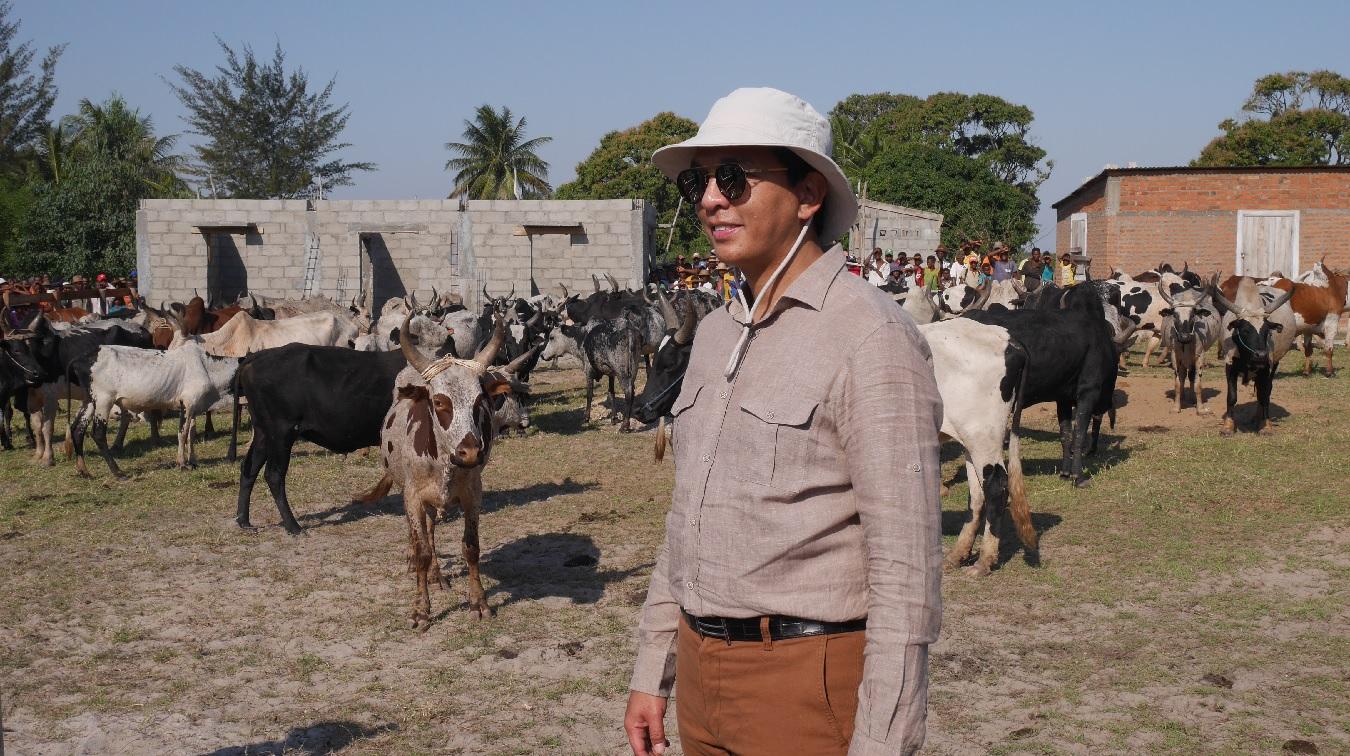By Hlazo Mkandawire and Jason Hopps
Zebu cattle play a starring role in Madagascar’s culture and economy. The distinctive humped back animals, valued at several hundred dollars each, support the livelihoods of herders, their families, and sometimes whole communities across the Indian Ocean island.
Sadly, the prized Zebu also make a tempting target for thieves—known locally as ‘dahalos’—in a country where the bulk of the population lives on less than $2 a day.
According to estimates from Madagascar’s government, almost 60,000 Zebus were stolen between 2018 and 2020, robbing herders of years of hard work, dedication—and, of course, their incomes.
But now, a tagging and online identification program, supported by IFC's Madagascar Agribusiness project and the Government of Japan, is helping herders keep their animals safe.
In late 2021, Madagascar’s president, Andry Nirina Rajoelina, officially launched the pilot Livestock Identification and Traceability System (LITS) in four regions of southern Madagascar, the poorest part of the country.
The LITS project plans to tag 80,000 Zebus by 2023—and then hundreds of thousands more across the country if early results are promising.
“This system is essential because it will counter zebu thefts and also keep a detailed record of the health of the animals,” said Madagascar’s Minister of Agriculture and Livestock, Harifidy Ramilison. "Partnering with IFC and the Government of Japan on the system will also transform the way livestock are bought and sold, increase herders' incomes, and deliver health and economic benefits to the cattle industry.”

President Andry Nirina Rajoelina during the launch of the pilot project in Ankaramena, Anosy Region
“Zebuscan”
The way the system works is simple: a Zebu’s ear is affixed with a tamper-proof tag that has a unique identification number. The tag and ID number are linked to an online database that holds a photo of the animal and pertinent health and identification details.
The process relies on smartphones loaded with specialized software known as “Zebuscan”. When a zebu is stolen or lost (the ownership of each animal is confirmed by local officials) the breeder reports it to the police or health services, who then record it in the database. An SMS is automatically generated to alert authorities.
The system’s real magic happens at animal checkpoints, which dot Madagascar, and at markets and other possible points of sale. Thanks to the system, authorities can identify each animal and consult the database to learn if it has been reported stolen.
“This new online system will replace the old manual system, which is easy to tamper with,” said Amina Khaled El Zayat, IFC Senior Operations Officer. “With the new system, ownership of Zebus cannot be transferred, and the animal cannot be sold on the market without the information being verified using the online database.”
21st Century Overhaul
Similar tagging systems have proven successful in Europe, the United States, and elsewhere. In Africa, countries including Namibia, Botswana, and Kenya have pioneered animal tagging.
In Madagascar, Stop-Winlock’s role has involved advising the Ministry of Agriculture and Livestock on implementing and running the system, and helping the government migrate from paper-based ID records.
Although the new system has been generally well received in Madagascar, some herders have expressed concern about how it works. IFC is helping alleviate their doubts through information sessions where the tagging system—and its benefits—are thoroughly explained.
“The ear tags are more reliable, which motivated me to place them on my Zebus,” said Mara Tsaralahy, a Malagasy livestock farmer who participated in the LITS pilot project. “With these tags, stolen Zebus can be traced because all the information, including the name of the owner, is now in a database.”
A boy herding Zebu cattle near the village of Mongaiky, Madagascar. Photo: Karel Prinsloo
Wider Strategy
The tagging project is part of a wider World Bank Group strategy to help Madagascar strengthen its livestock sector that includes support to improve veterinarian services, animal pastures, and even animal breeding and rearing.
Japan, through the Global Agriculture and Food Security Program (GAFSP), is providing up to $950,000 to the Zebu tagging pilot project. Besides supporting this project, the Government of Japan is a leading IFC partner globally, with its support focused on advisory projects in agribusiness, supply chains, health, infrastructure, financial inclusion, SMEs, and other sectors.
Looking ahead, those leading the project in Madagascar said they might add a geolocation feature, which can easily be built into the current tagging system.
“Seemingly simple improvements like this tagging system can have a dramatic impact on the lives of ordinary people,” said Marcelle Ayo, IFC Country Manager for Madagascar. “Technology is not a panacea, but its application can ease age-old problems and bring peace of mind to those whose lives might depend on safekeeping just one or two animals.”
Published May 2022
